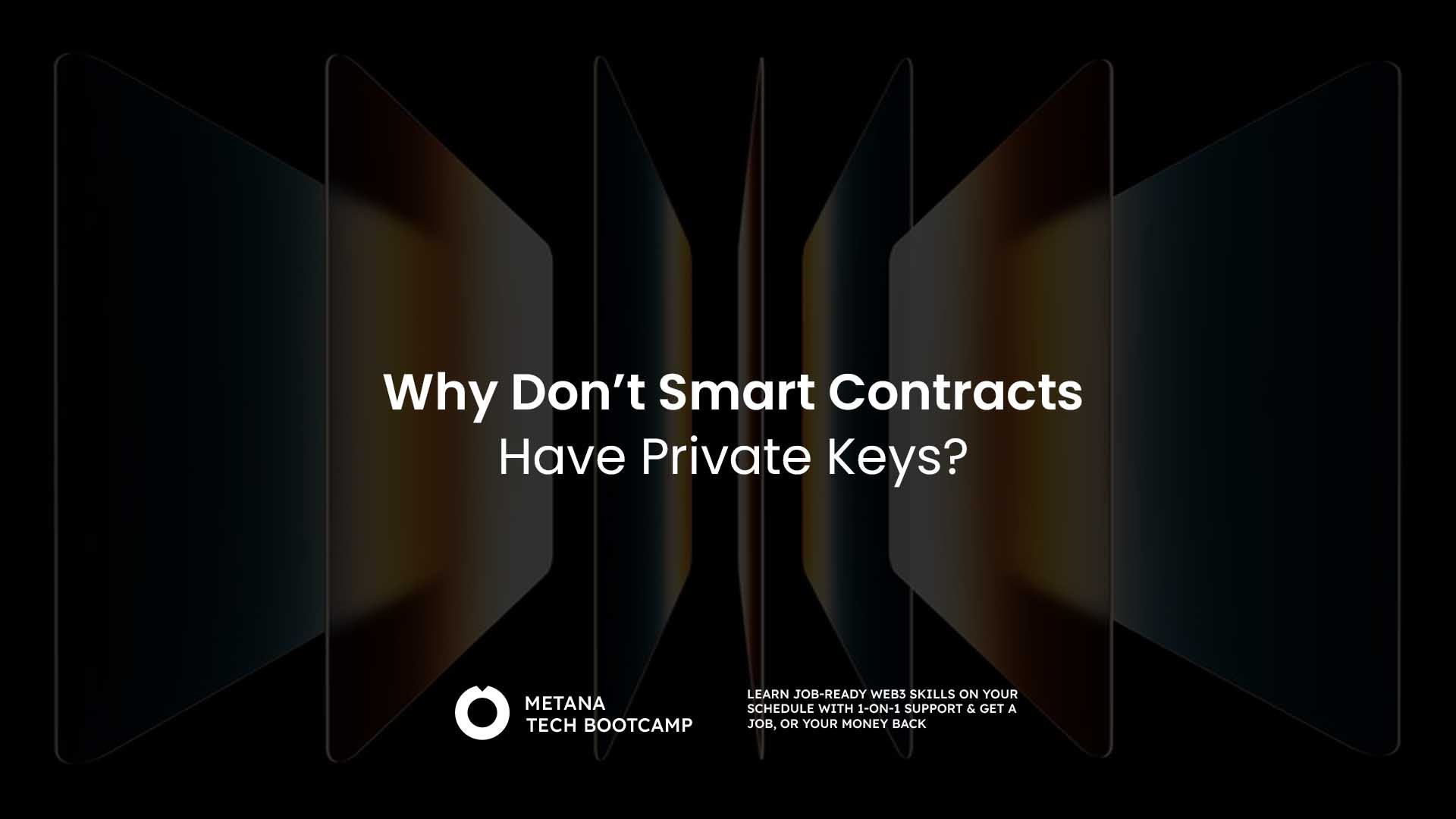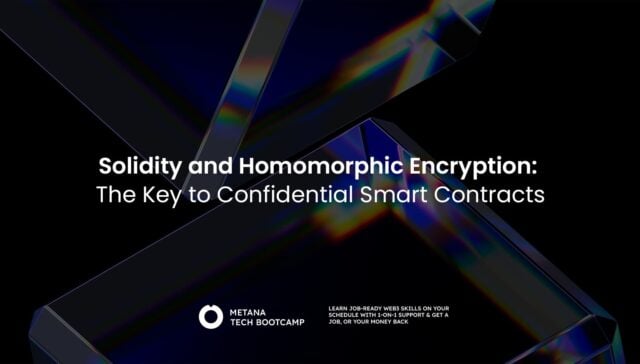TL;DR:
- Smart contracts are self-executing programs on blockchains like Ethereum, operating without intermediaries.
- They lack private keys because they aren’t “owned” by any individual; once deployed, they run autonomously.
- Private keys would imply external control, contradicting the decentralized and trustless nature of smart contracts.
- The absence of private keys enhances security by eliminating risks associated with key theft.
- Understanding this distinction is vital for grasping blockchain security and the functionality of decentralized applications.
Smart contracts have become one of the most revolutionary aspects of blockchain technology, especially in decentralized finance (DeFi), digital assets, and automation. These self-executing contracts operate without intermediaries, making transactions faster, more secure, and efficient. But a frequently asked question is: why don’t smart contracts have private keys? In this article, we’ll break down the answer to this question and provide a clear understanding of how smart contracts work, why they differ from traditional accounts, and what this means for security and functionality.

What Are Smart Contracts?
A smart contract is a self-executing program with predefined rules written into code. Once deployed on a blockchain, the contract autonomously enforces the terms of the agreement. Since smart contracts are stored on decentralized, immutable blockchains like Ethereum, no third party is required to oversee or validate the terms. This makes transactions trustless, meaning the code guarantees execution when conditions are met.
Smart contracts are predominantly used in various applications such as:
- Decentralized Finance (DeFi): Facilitating lending, borrowing, and trading without intermediaries.
- NFTs: Managing ownership and royalties of digital art.
- Supply Chain Management: Tracking products through their life cycle.
The Basics of Public and Private Keys in Blockchain
To understand why smart contracts don’t have private keys, it’s important to understand the basic structure of blockchain and key management.
Blockchain uses public-key cryptography to secure transactions. Every user in a blockchain ecosystem has two keys:
- Public Key: This is like an account number that can be shared openly. It is used to receive funds or information.
- Private Key: This key must be kept secret and is used to sign transactions. The private key proves ownership of an account and grants control over its funds.
Most blockchain users have what’s known as an Externally Owned Account (EOA), controlled by a private key. When a user wants to interact with the blockchain—send tokens, execute a contract, or access funds—they must sign the transaction with their private key. Without it, no transaction can be authorized.
Smart Contracts: Accounts Without Private Keys
Unlike users who control externally owned accounts with private keys, smart contracts are not externally owned. Instead, they are deployed onto the blockchain, becoming part of the network’s decentralized structure. When a smart contract is created, it is assigned a unique contract address, similar to an account address, but it doesn’t need or have a private key to function.
Why?
- No Ownership: Smart contracts are not “owned” by anyone after they are deployed. Once live, they run autonomously and according to predefined code. A private key would imply that someone holds control over the smart contract, which defeats its purpose of being trustless and decentralized.
- Immutable Logic: Smart contracts are programmed to follow specific logic that cannot be changed or overridden after deployment. If a private key were involved, it would introduce a layer of authority that could change the contract’s behavior, undermining its transparency.
- Autonomous Execution: A key feature of smart contracts is that they execute automatically when triggered by certain events or transactions. They don’t need external input, like a private key holder, to validate their operations. The logic within the contract ensures that actions are carried out, provided the right conditions are met.
EOAs vs. Smart Contract Accounts: Key Differences
To better understand why smart contracts don’t need private keys, let’s compare them to externally owned accounts:
| Feature | EOA (Externally Owned Account) | Smart Contract Account |
|---|---|---|
| Ownership | Controlled by a private key owner | No ownership; runs autonomously |
| Private Key | Required to sign and authorize transactions | No private key; no need for external control |
| Code | Cannot execute code | Executes code as per the contract’s rules |
| Transaction Trigger | Requires user input (signed transaction) | Triggered by events or external transactions |
| Immutability | Actions can be reversed by private key owner | Code is immutable once deployed |
Why Is This Important for Security?
Smart contracts without private keys offer unique security advantages. For one, since no private key is associated with the contract, it eliminates the risk of private key theft—a major concern in blockchain security. If someone gets hold of your private key in a traditional EOA, they gain full control of your funds and transactions. But since smart contracts operate autonomously without human intervention, the attack surface is smaller.
That said, smart contracts have their own set of risks. Bugs in code or vulnerabilities can lead to hacks and exploits, as seen in incidents like The DAO hack, where a flaw in the contract’s code allowed attackers to drain millions of dollars in Ethereum. The absence of a private key doesn’t make smart contracts invulnerable, but it shifts the security focus to ensuring that the contract’s code is sound and thoroughly audited before deployment.
Example: Decentralized Exchanges (DEXs)
Let’s look at how decentralised exchanges (DEXs) operate with smart contracts that don’t have private keys. Platforms like Uni swap or Sushi Swap run entirely through smart contracts, which allow users to trade tokens directly from their wallets without intermediaries. The smart contract facilitates the trade when both parties’ conditions are met, such as the amount of tokens and the agreed price.
These contracts manage massive amounts of liquidity and automatically execute trades without anyone having direct ownership of the funds in the pool. There’s no single entity holding a private key that can withdraw these funds. Instead, everything is governed by the rules coded into the smart contract.
Can Smart Contracts Ever Use Private Keys?
While smart contracts themselves don’t have private keys, they can interact with EOAs that do. For instance, if you want to interact with a decentralized application (dApp), you need to sign a transaction with your private key to trigger the smart contract. The contract can then execute its logic based on your input but cannot alter the terms or control your private key.
There’s also been some research into using Threshold Cryptography to allow certain operations of smart contracts to be executed only when a consensus of key holders agrees. This is different from a traditional private key model, as no single entity would have complete control.
Implications for Decentralization
The lack of private keys in smart contracts aligns with the decentralised ethos of blockchain technology. By removing centralised control and enabling code to act as law, smart contracts provide a higher degree of trust and transparency in financial and non-financial applications. The trade-off is that users must rely on the accuracy of the contract’s code, emphasising the importance of code audits, thorough testing, and secure development practices.
Conclusion
Smart contracts are powerful tools that bring transparency, security, and automation to various industries. Their autonomous nature means they don’t require private keys because they are designed to function without direct human control. While this presents certain advantages, such as reduced risk of private key theft, it also places greater emphasis on the reliability of the contract’s code.
In summary, the reason smart contracts don’t have private keys is rooted in their decentralised, autonomous design. By eliminating the need for private key control, they ensure that no single entity can manipulate the contract’s operations, reinforcing the trust less environment of blockchain technology.
Key Takeaways:
- Smart contracts are self-executing programs on blockchain that don’t need private keys.
- Unlike EOAs, smart contracts operate autonomously and immutably, governed by predefined code.
- The absence of private keys enhances security by reducing the risk of theft but increases the need for rigorous code auditing.
- Examples like decentralised exchanges show how smart contracts function in real-world applications without the need for external control.
By understanding why smart contracts don’t have private keys, we gain a deeper appreciation for their role in decentralizing industries and enabling trust less interactions in a variety of sectors.





